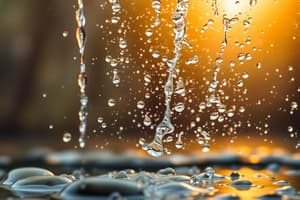Podcast
Questions and Answers
What is the collective of all the water at or near the surface of the Earth, in all states of matter, known as?
What is the collective of all the water at or near the surface of the Earth, in all states of matter, known as?
- Atmospheric cycle
- Aqueous system
- Hydrosphere (correct)
- Water conglomerate
What are the three main parts of the water cycle?
What are the three main parts of the water cycle?
- Percolation, crystallization, and desalination
- Evaporation, condensation, and precipitation (correct)
- Sublimation, deposition, and runoff
- Infiltration, transpiration, and saturation
What happens during condensation in the water cycle?
What happens during condensation in the water cycle?
- Water vapor molecules come together and cool, forming liquid water (correct)
- Liquid water is heated by the sun and evaporates into atmospheric water vapor
- Liquid water returns from the atmosphere to the surface as rain, sleet, snow, hail, etc.
- Liquid surface water is heated by the sun and evaporates into atmospheric water vapor
What is the continuous process of water movement from the Earth's surface to the atmosphere and back?
What is the continuous process of water movement from the Earth's surface to the atmosphere and back?
What is the term for the process where liquid surface water is heated by the sun and evaporates into atmospheric water vapor?
What is the term for the process where liquid surface water is heated by the sun and evaporates into atmospheric water vapor?
Which part of the water cycle involves water returning from the atmosphere to the surface as rain, sleet, snow, hail, etc.?
Which part of the water cycle involves water returning from the atmosphere to the surface as rain, sleet, snow, hail, etc.?
What is the term for the process where water vapor molecules come together and cool, forming liquid water?
What is the term for the process where water vapor molecules come together and cool, forming liquid water?
What is sublimation in the context of the water cycle?
What is sublimation in the context of the water cycle?
What is transpiration in the water cycle?
What is transpiration in the water cycle?
What is runoff in the context of the water cycle?
What is runoff in the context of the water cycle?
What is infiltration in the water cycle?
What is infiltration in the water cycle?
What is evaporation in the water cycle?
What is evaporation in the water cycle?
What is condensation in the water cycle?
What is condensation in the water cycle?
What is precipitation in the context of the water cycle?
What is precipitation in the context of the water cycle?
What is the significance of the water cycle?
What is the significance of the water cycle?
Flashcards are hidden until you start studying
Study Notes
The Water Cycle: Key Processes and Importance
- Sublimation is the instantaneous change from frozen water, such as snow, to gaseous water vapor, without melting into a liquid
- Transpiration is the process where liquid water within plants is heated by the sun and evaporates through openings in their leaves, called stomata
- Runoff occurs when gravity pulls liquid water in a flow of precipitation over the ground, common during and after large rain events
- Infiltration is the process where liquid water percolates down through the soil into the ground, replenishing aquifers
- The water cycle involves phases of evaporation, condensation, and precipitation, occurring above, on, and below the Earth's surface
- Evaporation is the process by which heated liquid water changes state to gaseous water vapor, often driven by energy from the sun
- Condensation is the process through which gaseous water vapor becomes liquid water, leading to cloud formation and dew
- Precipitation is the process by which water returns to Earth's surface from the atmosphere, taking forms such as rain, snow, or hail
- Water can exist in three phases: liquid, solid (ice), and gas (water vapor), with the water cycle facilitating transitions between these phases
- Other parts of the water cycle include sublimation, transpiration, runoff, and infiltration, which contribute to the movement and transformation of water
- The water cycle is vital for sustaining life on Earth, as it recycles the limited freshwater supply, with roughly 3% of all water on Earth being freshwater
- Understanding the water cycle processes is crucial for managing and preserving the Earth's water resources, ensuring its availability for various uses
Studying That Suits You
Use AI to generate personalized quizzes and flashcards to suit your learning preferences.




